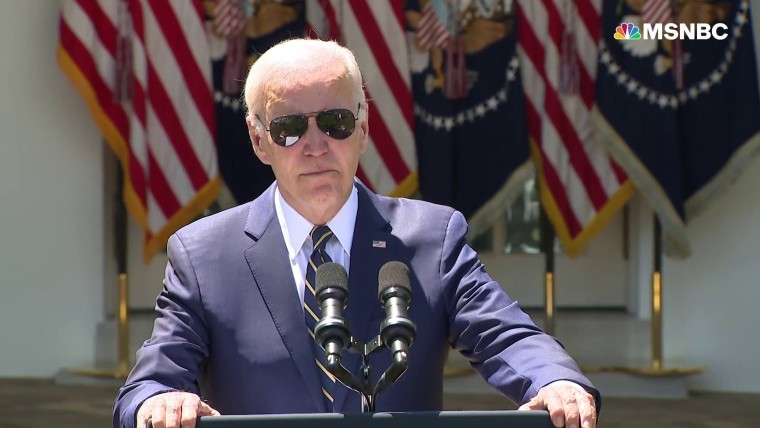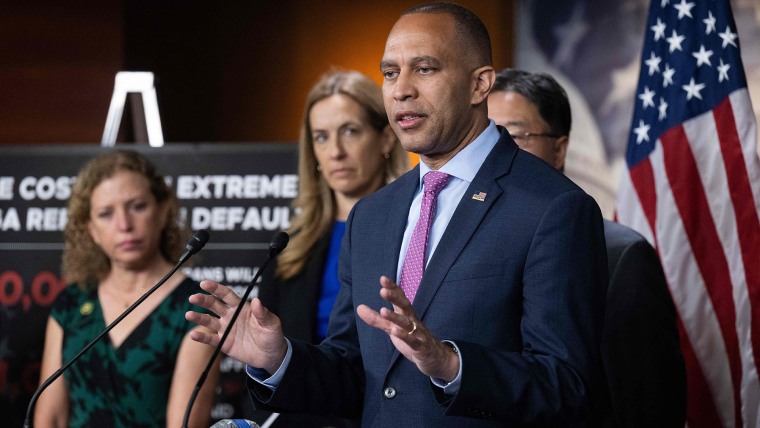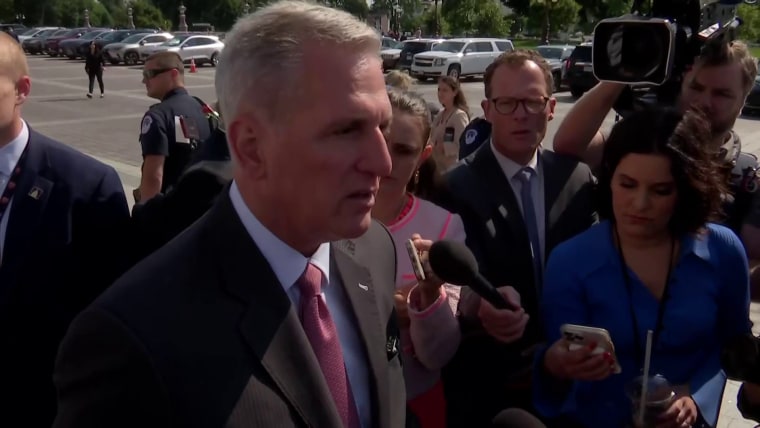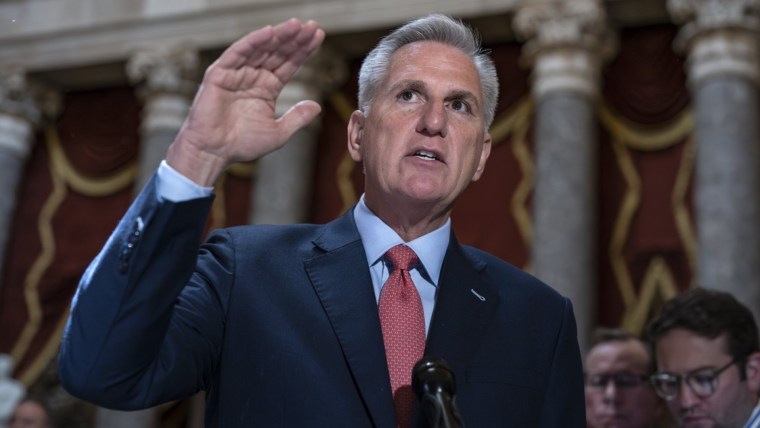Debt ceiling live updates: Negotiators ‘worked until midnight’
Jayapal says Dems were told they could be called back to D.C. as early as Sunday
Rep. Pramila Jayapal, D-Wash., emerged from a closed-door Democratic caucus meeting on Thursday and said she and her colleagues were told the earliest they would have to return to Washington, D.C. is Sunday.
“We were told the earliest it could be was Sunday, and that the Republicans have scheduled baseball practice for Wednesday and Thursday,” she said. “So I guess sometime in between those days.”
Jayapal chairs the Congressional Progressive Caucus, which has been urging the White House not to give in to GOP demands in the debt ceiling talks.
Biden: Congressional leaders agree that ‘there will be no default’
Biden sought to assuage concerns that the U.S. could default on its debt, saying the two sides had made “progress” in negotiations but that the “only way” to move forward is with a bipartisan agreement.
In a speech at the Rose Garden, Biden implicitly pushed back against suggestions he could use the 14th Amendment to unilaterally raise the debt ceiling. He characterized his conversations with McCarthy as “productive” and said staff from both sides were meeting as he spoke this afternoon.
Biden said that defaulting on the national debt was “not an option,” and that congressional leaders agreed that “there will be no default.”
“The American people deserve to know that their Social Security payments will be there, that veterans’ hospitals remain open and that economic progress will be made and we’re going to continue to make it,” Biden said.
He added, however, that staff are negotiating budget cuts to get the U.S.’s “fiscal house” in order.
“I don’t believe the whole burden should fall on the backs of middle-class and working-class Americans,” Biden said. “My House Republican friends disagree.”
White House says Congress is the only option
White House press secretary Karine Jean-Pierre was asked today why the administration doesn’t have a Plan B.
“What I can say is the only option right now is for Congress to do their jobs without conditions. That is the way that we need to move forward as it relates to the debt limit,” she said.
House’s most conservative members make new demands of McCarthy
Thirty-five members of the House Freedom Caucus, the conservative wing of the Republican party, wrote today to urge McCarthy to “deploy” party unity to take a tougher stance in negotiations with the White House.
The representatives, many of whom had opposed McCarthy’s initial bid to become speaker, affirmed their unity and called on their leader to hold out for a deal with many of Republicans’ top priorities.
“The only hope for transformative change in Washington comes from a unified House Republican Conference,” the lawmakers wrote. “You have that. We are behind you. Use our unity to make history.”
The representatives specifically encouraged McCarthy to claw back unspent Covid funds and demand a repeal of funding for new IRS agents.
They called on McCarthy to add additional provisions to the bill that the House previously passed, including cutting funding for the FBI’s new headquarters and adding Republican priorities around immigration and the border.
The lawmakers’ letter referred to debt ceiling negotiations as a “manufactured crisis” and called on McCarthy to force Yellen to make public the math underpinning her projection that the U.S. government could be unable to pay some of its bills as soon as June 1.
White House criticizes RNC chair for saying a default would ‘bode very well’ for GOP in 2024
The White House criticized Republican National Committee chair Ronna McDaniel in response to her remarks yesterday saying that GOP presidential candidates could potentially benefit from the U.S. defaulting.
During an interview on Fox News yesterday, McDaniel said, “This is a president that is failing the American people. So I think that bodes very well for the Republican field.”
In a statement, White House deputy press secretary Andrew Bates criticized McDaniel for her “appalling and revealing” remarks that support “triggering an unprecedented economic downturn” for “perceived political benefit.”
“Regardless of how liberal or conservative leaders are, their highest priorities must be protecting America’s national security and the livelihoods of American families,” Bates said. “They have a duty to never undermine either for any reason. These horrifying remarks explicitly wish an historic catastrophe on the entire country — Democrats, Republicans, and Independents.”
“Ronna McDaniel just told the American people that causing unemployment, bankruptcies, and the obliteration retirement dreams is worth scoring the cheapest political points imaginable; that she’s willing to sell our future out to China in the name of self-serving political greed,” he added.
Debt ceiling impasse derails planned international congressional travel
The impasse of the debt ceiling is delaying trips lawmakers had planned to leave the country.
China Select Committee Chairman Rep. Mike Gallagher, R-Wis., was supposed to lead a group to Taiwan this weekend but that has been postponed because of uncertainty on the House schedule, according to source familiar with the plans.
Foreign Affairs Committee Chairman Michael McCaul, R-Texas, just told reporters he was supposed to travel to Mexico and Guatemala but may have to postpone.
Will debt holders first in line for payments from the government?
If the U.S. runs out of money, Treasury Secretary Janet Yellen has the option to pay bondholders the interest they are owed on U.S. Treasuries first and delay paying all other bills, like Social Security and veterans benefits, until the government has enough money to do so, said economists and budget policy experts. That was a strategy Treasury officials said they had gamed out in 2011 when the U.S. came close to default back then.
Failing to pay bondholders would likely have the biggest repercussions across the economy because of the chaos it would create in the financial markets, since Treasuries are seen as one of the safest investments in the world.
A failure to make those payments would almost certainly trigger a downgrading of the U.S. credit rating, making it more expensive for the government to borrow money and driving up interest rates for anyone else looking to borrow money for a home, car or with a credit card, said economists. It would also cause banks to significantly pull back on lending, cutting off lines of credit to businesses that need to borrow money for everything from an expansion to making that month’s payroll. The value of the dollar would also be affected, having an impact on companies that buy or sell goods overseas.
Giving priority to bondholder payments could also come with political consequences for the Biden administration if it’s viewed as investors getting paid while others, like Social Security recipients, miss getting their checks on time.
Jeffries: U.S. may default on its debt because ‘extreme MAGA Republicans have chosen to get out of town’
In remarks on the House floor, Jeffries accused “extreme MAGA Republicans” of manufacturing an “unreasonable” debt ceiling crisis amid the lack of an agreement with White House negotiators.
“We are here on the floor today because this default crisis is before the American people as a result of extreme MAGA Republicans making the political calculation that they will benefit in 2024,” Jeffries said, referring to former President Donald Trump’s 2016 campaign slogan “Make America Great Again.”
Jeffries took aim at Republicans who flew home to their districts before a deal could be reached ahead of the looming June 1 deadline, and anticipated a “fake narrative” they will potentially use to point fingers at Biden if the U.S. defaults on its debt for the first time in history.
“On June 1, America may run out of the ability to pay our bills and extreme MAGA Republicans have chosen to get out of town before sundown to flee Washington DC, to risk a dangerous default in a crisis that they’ve created,” he said. “And these Republicans, they’re going to say that Joe Biden refused to sit down with them. That’s a fake narrative that they’ve continued to try to put into the public domain.”
Democrats take to floor to chide GOP for adjourning without debt deal
House Democrats gave speech after speech on the floor this morning, lambasting McCarthy and Republicans for sending members home for the Memorial Day weekend before a deal is reached to avert a debt default.
Organized by Minority Whip Katherine Clark and the leadership team, the series of back-to-back one-minute floor speeches is part of messaging push to blame Republicans for a catastrophic default that could happen one week from now.
“Members are urged to demand Speaker McCarthy keep the House in session and share constituent stories that highlight the local impact of the devastating cuts proposed by Republicans to critical programs that keep Americans housed, fed, healthy, and secure as they hold America’s economy hostage,” Clark wrote in a letter to colleagues, urging them to participate.
Minority Leader Hakeem Jeffries, D-N.Y., and Reps. Judy Chu, D-Calif, Troy Carter, D-La., and Cori Bush, D-Mo., were among those who gave speeches.
The more aggressive effort from Hill Democrats came after private and public griping that Biden and his White House team weren’t doing enough to push back on Republicans, who have been casting blame on the president for the debt standoff.
Though many lawmakers rushed this morning to catch planes back to their districts, a number of House Democrats said they would stick around the Capitol to participate in the floor effort and discuss strategy heading into the weekend.
Democrats are scheduled to huddle behind closed doors in the basement of the Capitol at noon.
Jeffries says Biden will ‘hold the line’ on the most ‘devastating’ GOP-proposed cuts
Asked by NBC News if his caucus is prepared to vote for unfavorable cuts to government programs if President Biden agrees to them, House Democratic Leader Hakeem Jeffries, D-N.Y., said he believes Biden will “hold the line” when it comes to the most “devastating” cuts Republicans are proposing.
“It’s unacceptable, that on the one hand, you have Republicans pretending as if they would never cut anything that will adversely impact the health, the safety or the well-being of veterans and military families, but doing the exact opposite, as has been outlined by our members,” he said during a press conference this morning.
Jeffries added that he’s confident the “worst” of the cuts will not be in any debt ceiling bill that comes to the floor.
“And it’s my expectation that those cuts that have been proposed by Republicans, that they are trying to extract as a result of holding the economy hostage and continuing to threaten default will not be before the Congress because of the advocacy of the veterans’ services organizations, the advocacy of these members, and President Biden and Democrats continuing to hold the line.
Possible fallout after Fitch placed U.S.’ AAA on rating watch negative
Here are some possible scenarios after Fitch put the United States’ AAA long-term foreign currency issuer default rating on negative watch last night. The warning, which is a standard procedure for credit agencies before pulling the trigger on a downgrade, gives the firm or entity in question (in this case, the United States) time to clean up its act:
- Fitch’s warning increases the pressure because legislators on both sides of the aisle will now see Wall Street even more on edge.
- Other credit agencies will likely be tempted to issue their own warnings shortly, triggering a dominion effect.
- Fitch could move from a warning to an actual downgrade, although the warning suggested the U.S. would need to pass June 1 without a resolution for the agency to implement an actual downgrade.
More work to do, White House official says, but can’t rule out deal today
Negotiators for the White House and congressional Republicans had a second extended negotiating session late into last night, in addition to the one that lasted four hours in the afternoon. The staff is getting read in now, given how late they wrapped yesterday, a White House official said.
The official didn’t rule out a deal being announced today but did lower expectations of it because there’s more work to do.
McCarthy says he’s spoken to Trump about debt ceiling talks
McCarthy said today he’s spoken to former President Donald Trump in recent days about the debt ceiling talks.
The House speaker said Trump told him to get a “good agreement” in the negotiations.
Trump, who called the debt ceiling “sacred” when he was president, said in a CNN town hall earlier this month that Republicans should “do default” unless Democrats agree to “massive” spending cuts.
He also suggested that the economic damage from a default might not be as catastrophic as economists predict.
“You don’t know. It’s psychological. It’s really psychological more than anything else. And it could be very bad. It could be, maybe, nothing,” Trump said.
McCarthy touts ‘progress’ on debt limit, unsure of a deal today
McCarthy said on Fox News that it’s “possible” to get a deal today but he isn’t sure.
“I don’t know if we’ll have a deal today,” the House speaker said. “We did make progress yesterday, but we still have a number of items that need to get through.”
“I’m going to hold every day possible to get this done. We will get this done at the end of the day,” he continued. “But we’re going to get an agreement that’s worthy of the American public and the one thing I will tell people is, this deal won’t solve all the problems.”
“And whatever we don’t achieve here, we’ll come back the next day,” McCarthy said, calling an agreement “the first step” to balancing the budget.
What’s the difference between a default and a shutdown?
A debt ceiling breach would look different from a government shutdown in a number of ways and would come with much greater consequences for the economy than a shutdown, which the U.S. has been through numerous times in recent years.
“We know what a government shutdown looks like, we have been there before, it doesn’t look pretty but it also isn’t catastrophic,” said Shai Akabas, director of economic policy at the Bipartisan Policy Center. “With the debt limit, it is totally uncharted territory and we could see ramifications that would affect every American household.”
A government shutdown is triggered when Congress fails to pass legislation to fund the government. As a result, federal workers aren’t paid, nonessential workers stay home and certain services that receive federal funding, such as the National Parks, are closed. But mandatory programs, such as Medicare and Social Security, aren’t affected.
But in the case of a debt ceiling breach, all federal spending is affected, including Medicare payments, Social Security checks and veterans benefits. Federal workers would likely still be required to report to work, but may not get paid on time.
GOP senator threatens to impede debt ceiling deal
Sen. Mike Lee, R-Utah, appeared to threaten the chances of the Senate easily passing a debt ceiling deal between House Republicans and the White House if it falls short of “substantial spending and budgetary reforms” that he supports.
A speedy vote on any bill in the Senate requires all 100 senators to agree. Any one senator who votes against it can slow down the process, but not block it completely. If the House passes a deal in the hours before the looming June 1 deadline, it could take days to pass through the Senate.
Negotiators ‘worked until midnight,’ McCarthy says
Negotiators for the White House and congressional Republicans “worked until midnight last night,” to hammer out a deal to raise the debt ceiling, McCarthy said this morning.
He added that negotiations would continue today and that the two sides “are working to get it done.”
White House urges Congress to pass ‘reasonable’ bipartisan deal after Fitch warning
The White House called on Congress to quickly pass a reasonable debt limit deal last night after Fitch warned that it may downgrade the U.S. credit rating.
“This is one more piece of evidence that default is not an option and all responsible lawmakers understand that,” a White House spokesperson said in a statement shortly after the credit rating agency issued its warning. “It reinforces the need for Congress to quickly pass a reasonable, bipartisan agreement to prevent default.”
McCarthy says negotiators have ‘made some progress’ but snags remain
Negotiators for the White House and congressional Republicans have “made some progress,” McCarthy said, but just days ahead of a potential default, issues remain.
Last evening, he struck a more optimistic tone, saying “things are better” than they were the day before.
Still, negotiations were stalled on a “couple issues,” he said, adding that Rep. Patrick McHenry, R-N.C., had stayed at the White House to discuss a lingering issue. McCarthy said he does not have another meeting scheduled with Biden.
Treasury says Fitch warning highlights need for ‘swift bipartisan action’
The warning from Fitch emphasizes the need for “swift bipartisan action” from Congress, the Treasury Department said.
Treasury Secretary Janet Yellen “has warned for months, brinkmanship over the debt limit does serious harm to businesses and American families, raises short-term borrowing costs for taxpayers, and threatens the credit rating of the United States,” Lily Adams, a department spokesperson, said in a statement last night.
The warning “underscores the need for swift bipartisan action by Congress to raise or suspend the debt limit and avoid a manufactured crisis for our economy,” she added.
The credit rating agency put America’s AAA long-term foreign currency issuer default rating on negative watch last evening, citing “increased political partisanship that is hindering reaching a resolution to raise or suspend the debt limit.”
The move was not a downgrade, but a warning it could do so.
Fitch warning sparks fresh finger-pointing
Fitch’s warning that it could downgrade the U.S. credit rating if a deal can’t be reached to raise the debt limit set off alarm bells and a fresh round of finger-pointing in Washington overnight.
A Republican source close to McCarthy told NBC News this is why the speaker has been urging the White House to engage in negotiations since February.
Republican Rep. Don Bacon of Nebraska said the Fitch warning is a clear sign it’s time to get a deal, and said that Biden and McCarthy “need to meet in the middle.”
Meanwhile, a Democratic official familiar with the negotiations said that negotiations “are already making progress but this certainly reinforces the need for swift action.”
Former Obama officials who lived through a similar crisis over the debt limit in 2011 were blunter.
“It’s Bad,” one said of the Fitch warning. The official joined the administration shortly after the debt limit debacle but noted that at the time, it was a “low point” for then-President Barack Obama “when his approval ratings and Congress’ tanked.”
A second Obama official, who was in the White House during the 2011 debacle, said: “It underscores the real risk of creating a ton of economic turmoil that would be entirely self-inflicted.” That official said that while there will be plenty of political blame to go around if the nation defaults, there is also concern Democrats will “pay the price because we’re in charge.”
Moody’s and S&P, two other ratings agencies, had placed the U.S. on negative watch during debt ceiling talks in 2011. S&P followed through with the downgrade; Moody’s did not.








